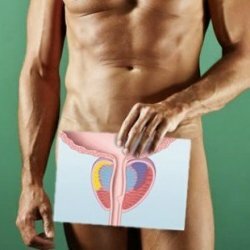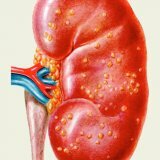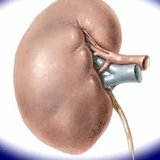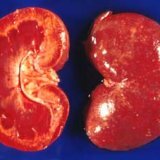Stages of inflammation of the prostate and methods of treatment
 Among the "male" diseases prostatitis more than others has acquired conjectures, erroneous ideas, prejudices. Meanwhile, a small gland was called "the second heart of men".She has a unique role in childbearing. Therefore, any failures of the most important organ are fraught with unpleasant consequences.
Among the "male" diseases prostatitis more than others has acquired conjectures, erroneous ideas, prejudices. Meanwhile, a small gland was called "the second heart of men".She has a unique role in childbearing. Therefore, any failures of the most important organ are fraught with unpleasant consequences.
The number of patients with prostatitis increases year by year. The reason for this is ecology, weakening of immunity in modern people, sexually transmitted diseases, various inflammations. With the flow of blood and lymphatic flu infections from the throat, oral cavity, small pelvis attack the prostate. Physiological features complicate treatment: nature has tried to ensure that the body important for the birth of healthy offspring does not mutate( altered) under the influence of toxins - including medicines, but the protection against microbes is weak.
The onset of the disease
The diagnosis of prostatitis is complicated by the fact that the gland is deeply hidden in the pelvis. Acute prostatitis is easily determined. If there is a high fever, frequent painful urination, chills, pain in the perineum, above the pubis, there are sometimes turbid or purulent discharge from the urethra - it's an acute prostatitis and you have to be treated in hospital conditions.
Unfortunately, much more often prostatitis has no acute onset - the process can last for years. Symptoms:
- is disturbed at times with rezi, a characteristic burning sensation when urinating;
- there are discharge from the urethra( urethra);
- "sluggish" becomes a stream of urine weakened;
- appears and disappears pain over the pubis,
- begin breakdowns in sexual life: premature ejaculation, weakening of the erection.
Sometimes these phenomena seem to disappear themselves, but then arise again. It is not necessary that all these symptoms are present. But if there is at least one of them or in the morning on the first visit to the toilet, you notice that in the urethra the outer opening is glued, and the jet first sprinkles, go to the urologist. Keep in mind: sluggish, hidden prostatitis, without treatment, gradually from the catarrhal stage( when the glandular tissue swells, and when it is still possible to help the prostate quickly enough) passes into the follicular, in which purulent foci, microabscesses form in the gland, the ducts are clogged. Then parenchymatous prostatitis develops, the alveoli are disconnected and die. They are replaced by connective tissue - causing sclerosis of the prostate. The gland already does not fulfill its functions, in addition it remains a hotbed of constant intoxication of the body. At the same time, there is a growing danger of complications: sclerosis of the neck in the bladder, infertility, purulent vesiculitis. In addition, sexual problems will also worsen.
Diagnosis
When examining a patient, it is simply necessary( albeit difficult) to find out not only the presence or absence of inflammation in the prostate, but also the culprit of the trouble. Assess the general condition of the body, and most importantly - at what stage the disease is. At the primary reference to the doctor you hand over on the analysis a blood, 2 portions of urine, undertake: a secret of a prostate, a smear of contents of a urethra. Microscopic studies, like bacteriological culture, will identify the culprits of inflammation. Knowing the pathogens, it is easier to choose antimicrobials. Aggressors often act as coccoid and rod-shaped microorganisms, which also cause inflammatory diseases of the genitals in women, pyelonephritis, pustular skin lesions. In recent years, the cause of prostatitis is becoming more urethritis, caused by chlamydia, trichomonias, mycoplasmas, ureplazmami, herpes virus. But they can be detected not by urologists, but by specialists on urogenital infections transmitted sexually.
Much about the condition of the prostate and the stage of the inflammatory process will tell the urologist a digital rectal examination of the gland. Ultrasound will also have to be done several times, so that the doctor can see the dynamics of the release of the gland from the foci of inflammation. Sometimes only after a few weeks of active therapy, clogged alveoli are revealed, and the secret of the prostate finally gives out the "villain" - the pathogen. At the early( catarrhal) stage of the disease, when the inflammatory process is active, the gland is enlarged, swollen, painful.
Stages of treatment of prostatitis
When specific pathogens are identified, the main thing is to destroy them. Here, intramuscular antibiotics and other anti-inflammatory drugs are indispensable. Take medication takes a long time. But the treatment is ineffective, until the outflow of secretion of the prostate gland is established. Therefore, antimicrobial therapy should always be supplemented by physiotherapy. Effective stimulators for cleaning the prostate and secretion outflow are devices of the Intraton series. The domestic device "Yarilo" proved to be very useful for anti-inflammatory laser therapy. Previously, the only stimulant for the secretion out of the gland was massage. They are still used now, where there are no modern devices or when physiotherapy is contraindicated. The best outflow of secret is facilitated by special exercises, walking. The removal of inflammation of the prostate restores sexual functions. But this is only at an early stage of the disease. If it is neglected, the sex therapist prescribes additional therapy.
The follicular stage of prostatitis is treated more heavily. Do not dispense with physiotherapeutic stimulation of secretion outflow and purification from purulent plugs of the prostate gland. Later, when the gland already doctors "stirred", the inflammation can become aggravated. Then connect antibiotics - without them the infection can not be overcome.
When there are already signs of sclerosis of the gland - it has become small and flat, instead of the alveoli, scar tissue has appeared, impregnated with infection - along with more active and prolonged therapy, specialists also use such a method as hyperthermia. Through a special rectal rod, high temperatures kill the microbes in the scar tissue. Even more radical measures are compelled to accept specialists in case of complications. When the sclerosed gland, like a clutch, clamps the urethra, it is necessary to remove the prostate.
Treatment at all stages should be supported by the right regimen: alcohol( even beer), seasonings, spicy dishes, hypothermia( especially legs), smoking are unacceptable. Prostatitis is cunning, it can recur. Lead a moderate sex life - for the gland, abstinence and too intense sexual activity are harmful.



